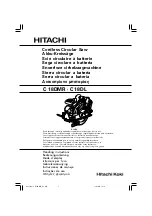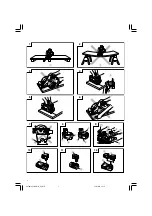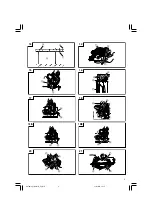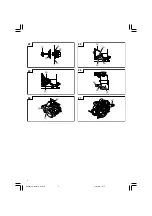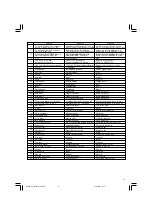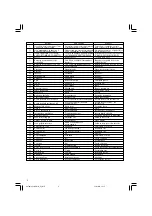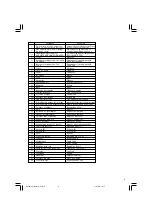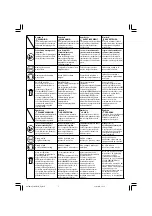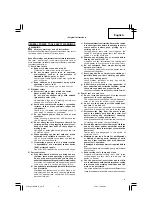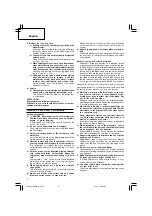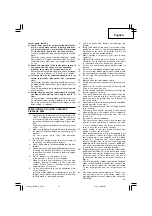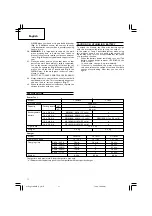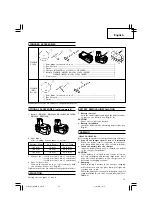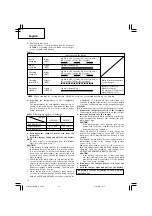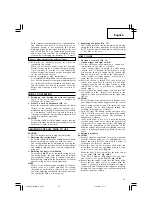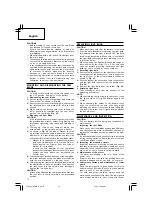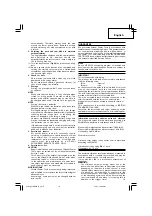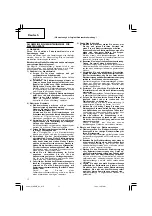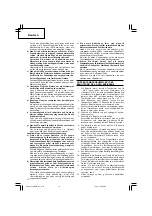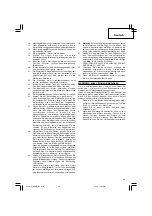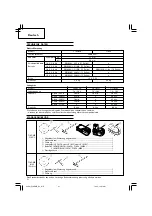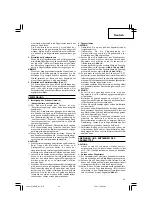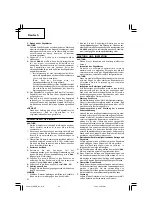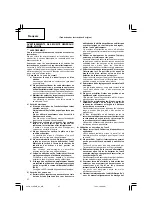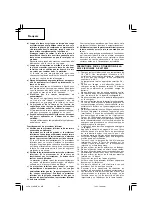
14
English
3. Regulating the guide (Fig. 17)
The cutting position can be regulated by moving
the guide to the left or right after loosening its knob
bolt. The guide may be mounted on either the right
or left side of the tool.
HOW TO USE
1. Operation of switch (Fig. 18)
(switch trigger and light switch)
(1) For safe operation of the machine, a “switch lock”
is provided on the side of a handle.
If the “switch trigger” is pulled in a state where
“switch lock” is pressed in the direction of the
arrow mark, the main switch can be turned ON.
And the “switch lock” is used as the “light switch”.
If the “switch lock (light switch)” is pressed in a
state, the light is turned ON.
(2) After the switch is turned ON, even when you
release your hand from the switch lock, the body
continues running and the light continues being
turned ON as long as you keep on pulling the
switch trigger.
(3) If you release the switch trigger, you can turn OFF
the switch and the “switch lock” returns to the
original position automatically and the light turns
OFF too.
CAUTION
䡬
Do not fix and secure the switch lock. Besides, keep
your finger off the switch trigger when the circular
saw is being carried around. Otherwise, the main
body switch can be inadvertently turned ON,
resulting in unexpected accidents.
䡬
Keep the light ON during cutting operation only.
If it is lit ON in other cases, the main body switch
can be inadvertently turned ON, resulting in
unexpected accidents.
䡬
If the main body is left as it is with the battery
inserted, there can be a case where the [switch lock]
touches the floor and/or wall surface and lights up
continuously, depending on the direction of the
body. Be careful, since continuous lighting can easily
make a full-charged battery go dead in about 3
hours.
2. Cutting procedures
CAUTION
䡬
Recheck that the saw blade is securely clamped.
䡬
Confirm that the wing nut for adjusting the slot
depth, the wing bolt for adjusting the angle of
inclination are securely clamped.
(1) Place the base on the material, then align the
premarked line and the sawblade with the notch
at the front of the base (
Fig. 16
).
When the base is not slanted, use the large cutout
as the guide (
Fig. 16
,
Fig. 19(A)
).
If the base is slanted (45 degrees), use the small
front scale as the guide (
Fig. 16
,
Fig. 19(B)
).
(2) Ensure that the switch is turned to the ON position
before the saw blade comes in contact with the
lumber. The switch is turned ON when the trigger
is squeezed; and OFF when the trigger is released.
Moving the saw straight at a constant speed will
produce optimum cutting.
As the internal chemical substance of new batteries
and batteries that have not been used for an
extended period is not activated, the electric
discharge might be low when using them the first
and second time. This is a temporary phenomenon,
and normal time required for recharging will be
restored by recharging the batteries 2 – 3 times.
How to make the batteries perform longer
(1) Recharge the batteries before they become
completely exhausted.
When you feel that the power of the tool becomes
weaker, stop using the tool and recharge its battery.
If you continue to use the tool and exhaust the
electric current, the battery may be damaged and
its life will become shorter.
(2) Avoid recharging at high temperatures.
A rechargeable battery will be hot immediately after
use. If such a battery is recharged immediately after
use, its internal chemical substance will deteriorate,
and the battery life will be shortened. Leave the
battery and recharge it after it has cooled for a
while.
PRIOR TO OPERATION
1. Setting up and checking the work environment
Check if the work environment is suitable by
following the precautions.
2. Prepare a wooden workbench (Fig. 13)
Since the saw blade will extend beyond the lower
surface of the lumber, place the lumber on a
workbench when cutting. If a square block is utilized
as a workbench, select level ground to ensure it
is properly stabilized. An unstable workbench will
result in hazardous operation.
CAUTION
To avoid possible accident, always ensure that the
portion of lumber remaining after cutting is securely
anchored or held in position.
ADJUSTING THE SAW PRIOR TO USE
CAUTION
Pull out battery before doing any adjusting.
1. Adjusting the cutting depth
As shown in
Fig. 14
, hold the handle with one hand
while loosening the wing nut with the other.
The cutting depth can be adjusted by moving the
base to the desired position. In such manner adjust
the cutting depth and then securely retighten the
wing nut.
2. Adjusting the angle of inclination
As shown in
Fig. 15
by loosening the wing bolt on
the incline gauge, the saw blade may be inclined
to a maximum angle of 50° in relation to the base.
After having completed the adjustment, reconfirm
that the wing bolt are firmly tightened.
NOTE
Values of the inclined gauge provided on the base
merely serve as a rough guideline. For cutting
operation at an inclined posture, use the circular
saw after adjusting the angle between the base and
the saw blade with a protractor, etc.
01Eng_C18DMR_DL_WE
11/21/08, 11:15
14

